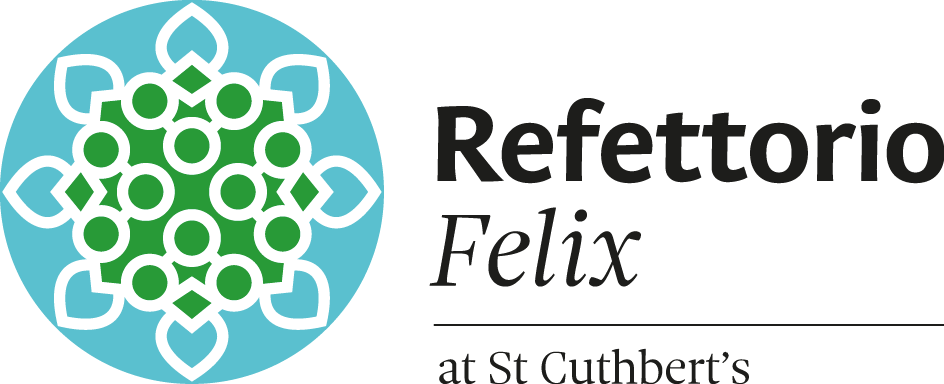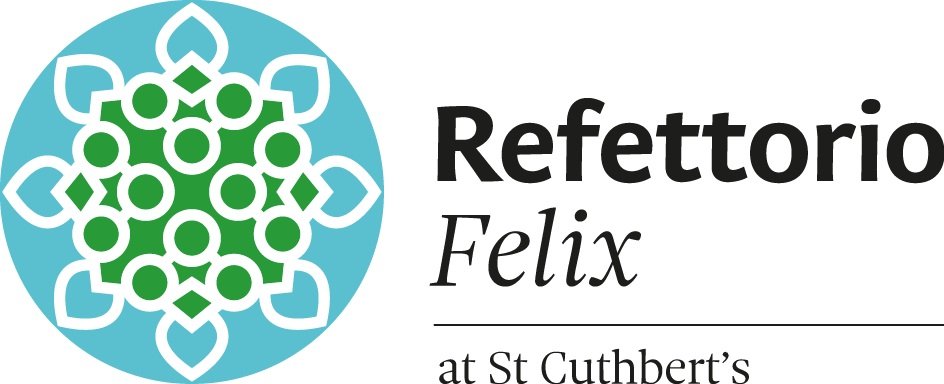More than your ordinary soup kitchen
A shorter version of this interview was published in The Court Magazine’s The Wellness Issue 2022.
Gorgeously presented three-course meals, connections with leading kitchens in London and brainchild of Italian national treasure, Chef Massimo Bottura - if you’ve heard of Refettorio Felix, these are likely the associations you may have with our drop-in centre in Earl’s Court. Less recognisable and perhaps less picture-friendly, however, is our extensive mental health and wellbeing programme which offers vital services to those who come through the door each day. Nick and Tina, Operations Manager and Mental Health Co-ordinator of the charity, shared their thoughts on how Refettorio Felix promotes a better quality of life for its guests.
Can you talk about the relationship between food, mental health and wellbeing at Refettorio Felix?
T: For many of our guests experiencing poverty, food is the initial draw to us. Once inside, especially if they’re coming every day, people begin to trust us more, to understand that this is a place where they are respected and valued, and a big reason for that is the style of our service - our volunteers serve a thoughtfully plated meal with real cutlery, like you’d receive in a restaurant - hospitality that most of our guests don’t normally get to enjoy.
N: The lunch service and all the other support services we offer are deeply intertwined - one couldn’t exist without the other. We encourage a spirit of sharing and companionship in the dining hall - when people who might not know each other sit down at the table, it’s quite a natural extension to start talking about yourself. When people sit down at the table, it’s quite a natural extension to start talking about yourself. The communal dining setting allows our guests to relax and open up in a space that becomes familiar and safe over time.
So services are built into an environment that’s informal and accessible?
N: Yes, that’s really key. Many of our guests can be suspicious of certain statutory services and the Centre feels nothing like a doctor’s office, or the Job Centre. People need encouragement to access help, but also to develop trust and have their own agency.
T: I think the integration between our guests is also really important to the success of our support services. It’s not just one demographic coming to visit us. Many day centres will only work with a much narrower client group - for very valid reasons, of course, but we don’t ask questions or require referrals. Mental health can be a taboo, even today, so the informality of our setting kind of neutralises things and we try to break those kinds of assumptions in a more casual way, instead of carrying all the baggage that a statutory environment comes with. You’d be surprised what people will share over a brew, with someone who might be a complete stranger and have a totally different background to themselves!
From that emphasis on a relaxed environment, I can see that a lot of our activities now are very creative - not explicitly called “mental health” or “counselling”. Can you talk a bit about the activities programme at Refettorio Felix?
N: It’s another opportunity to get to know people through a different lens. A small group environment is very different to the communal dining hall, or to a 1-2-1 setting. Most of our sessions have a therapeutic edge to them, but the activity foundation gives a normalising atmosphere to those conversations. Some people aren’t equipped to go straight into a counselling session - they might find the 1-2-1 really intense, but group activities can be a stepping stone to ease people to go deeper, in a creative way.
T: We know that for good mental health and wellbeing, any meaningful activity can have a really positive impact - good for the mind and body. Using our hands and so forth. Physical action can be a great stepping stone, as Nik said. People might be intimidated talking to a counsellor opposite them with the clock ticking down. By doing something with a concrete purpose, like knitting, or painting or whatever, those silences can feel productive and gives people an opportunity to reflect whilst being creative. Again, it’s a different way of encouraging people to open up, and can help them seek 1-2-1 or clinical help.
What else is special about the mental health & wellbeing programme here?
T: The beauty of the services we have here is that we have time. It’s not six sessions and you’re out. You can come here every day, for years. I’ve worked in statutory environments where there is a real limit and time pressure on the amount of attention you can give someone - a person might just start opening up to you on your sixth session but then that’s it, you’re done. Time is truly invaluable. Having funding for just one year or two doesn’t work. We’re lucky to have had mental health services running here for over 10 years now. What we’re offering people is the security and peace of mind that even if a million other things in their lives seem uncertain, they can rely on our presence and support.
N: If you’re truly listening to someone, their inner world and their wounds come forward. If they’re ready and they want to speak; if they’re just emerging; or for some people it might take a long, long time and we might only make little steps moving forward but they can be really beautiful and valuable.
What are the kinds of challenges you’re facing whilst running the support services here?
N: Since October 2021, we’ve been running a double operation with indoor dining and takeaways - we thought that the takeaways would dwindle down as COVID measures eased, but in fact, there’s a huge demand for it, it means we can feed more than double the number of people and we’ve recognised that it wouldn’t be right to end such a desperately necessary service. It does mean that we’re stretched thinner though, and as much as we look out for those getting takeaways, not having that physical closeness with someone means it’s easier to miss certain details about them - indications of a person’s wellbeing or struggles. Our priority is to take preventative action and ensure everyone’s able to get the support they need.
Finally, what developments can we look for in the future of the mental health & wellbeing programme at Refettorio Felix?
N: We’re hoping to expand mental health, counselling and psychotherapy with more 1-2-1, in-depth counselling services to offer long-term, especially because there’s such a big gap in services via the NHS and waiting lists are so prohibitively long.
T: Yes, we want to be able to offer a broader range of therapies, so crisis or trauma therapy as well as long-term counselling. We’re trying to help as many people as we can and recognise every situation is unique and can require a mixture of treatments.
Thanks so much to Nik and Tina for sharing their thoughts on the mental health & wellbeing provision at Refettorio Felix. If you’re in need of a friendly face, emotional advice or mental health support, please speak to Nik or Tina at the Centre.



